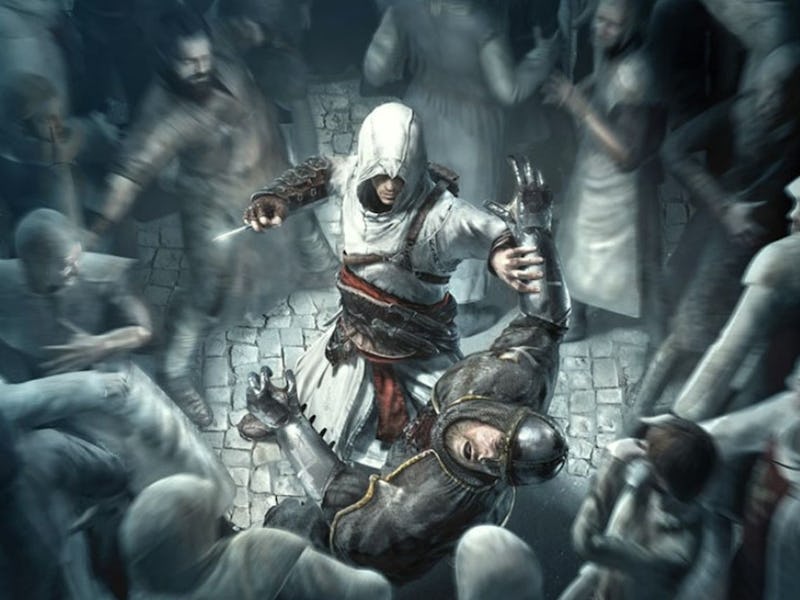Assassin's Creed Mirage leaks reveal a long-awaited change to the series
Nothing is true. Everything is permitted.

Assassin’s Creed is not the same as it was when the first title was released in 2007. Once filled with parkour, stealth, and history-spanning conspiracies, the franchise evolved into an amalgamation of light RPG elements and open-world checklists in Assassin’s Creed Origins. But new leaks suggest that the next entry in the franchise, Assassin’s Creed Mirage, will return the franchise to its roots, giving Ubisoft a chance to prove it has learned from the criticism the franchise has received in recent years.
The wide, wide world
Over the course of the 2010s, a certain type of open-world game came into prominence: the checklist game.
Assassin’s Creed has leaned into RPG elements since Origins.
Defined by its large sprawling world the player mainly viewed through a small mini-map bedazzled with endless icons that pointed to something to accomplish. While this freedom sounds exciting it was often shallow, with characters that did little and quests that could be categorized into fetch quests, escort missions, or collectives, to name the predominant structures.
Ubisoft became synonymous with this style of game, as the Assassin’s Creed and Far Cry franchises both leaned into this design mentality.
Beginning with 2017’s Assassins Creed Origins and solidified in 2018’s Assassin’s Creed Odyssey, Ubisoft transformed its stealth historical fiction franchise into a homogenous blob of meaningless task management. Developers on AC Odyssey cited The Witcher 3 and Skyrim as inspirations for the game but did not fill the world with interesting lore or deeply engaging side-quests. Gone was the focus on stealth and parkour. In its place was a focus on grinding to level up and attacking enemies directly in a light imitation of Soulslike heavy and light attacks.
Ubisoft has attempted to capitalize on trends set by other games.
This reinvention of Assassin’s Creed came out of necessity. The series was stagnating by the time the last “traditional” Assassin’s Creed game (Syndicate) was released. However, with three RPG Assassin’s Creed games under its belt, Ubisoft is finding difficulty in making the franchise feel interesting again. The reliance on trends to lift the franchise makes each newer entry feel like a time capsule of what the consensus of a “good game” was at the time of release — but trends fade.
Getting back to its roots
Elden Ring, FromSoftware’s interpretation of an open-world game, shattered the checklist mold and proved that game worlds could be filled with interesting content for players to naturally unravel on their own without being told what to do and where to go. It served as a living antithesis to Ubisoft's design approach. Without the ability to emulate current trends, Ubisoft needs to look back on what made Assassin’s Creed special in the first place. New leaks suggest developers on the next entry in the franchise are doing just that.
A YouTuber named j0nathan posted a video running down a series of leaks on Assassins Creed Mirage, the alleged title of the next AC game. It described the title as a “return to basics” for the franchise that will cut RPG elements like dialogue choice, gender choice, and leveling. It will also take place in one city: Baghdad. These leaks were corroborated by industry journalist Jason Schreier.
After years of trailing behind other developers, Assassin’s Creed Mirage is a chance for Ubisoft to show why the franchise still matters.
The main inspiration for Mirage is reported to be the first Assassin’s Creed. The title that began the franchise is rough around the edges but succeeded on the strength of its vision. While mechanics and story left players wanting, the core experience was something fresh. The ability to instant kill enemies with the hidden blade made the player focus on mastering stealth and the game’s parkour system to maneuver around the world in silence — being detected could lead to mission failure.
15 years later, Ubisoft has the technology and the experience to look back at this initial vision and create it anew with astounding clarity. The franchise does not need to follow trends when it can just continue the work that defined it as a unique experience in 2007.
Subscribe to Inverse Daily for more stories about games, science, and entertainment that you won’t find anywhere else.